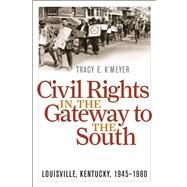Civil Rights in the Gateway to the South : Louisville, Kentucky, 1945-1980
, by K'meyer, Tracy E.- ISBN: 9780813130064 | 0813130069
- Cover: Paperback
- Copyright: 12/2/2010
Situated on the banks of the Ohio River, Louisville, Kentucky, represents a cultural and geographical intersection of North and South. Throughout its history, Louisville has simultaneously displayed northern and southern characteristics in its race relations. In their struggles against racial injustice in the mid-twentieth century, activists in Louisville crossed racial, economic, and political dividing lines to form a wide array of alliances not seen in other cities of its size. InCivil Rights in the Gateway to the South: Louisville, Kentucky, 19451980,noted historian Tracy E. K'Meyer provides the first comprehensive look at the distinctive elements of Louisville's civil rights movement. K'Meyer frames her groundbreaking analysis by defining a border as a space where historical patterns and social concerns overlap. From this vantage point, she argues that broad coalitions of Louisvillians waged long-term, interconnected battles during the city's civil rights movement. K'Meyer shows that Louisville's border city dynamics influenced both its racial tensions and its citizens' approaches to change. Unlike African Americans in southern cities, Louisville's black citizens did not face entrenched restrictions against voting and other forms of civic engagement. Louisville schools were integrated relatively peacefully in 1956, long before their counterparts in the Deep South. However, the city bore the marks of Jim Crow segregation in public accommodations until the 1960s. Louisville joined other southern cities that were feeling the heat of racial tensions, primarily during open housing and busing conflicts (more commonly seen in the North) in the late 1960s and 1970s. In response to Louisville's unique blend of racial problems, activists employed northern models of voter mobilization and lobbying, as well as methods of civil disobedience usually seen in the South. They crossed traditional barriers between the movements for racial and economic justice to unite in common action. Borrowing tactics from their neighbors to the north and south, Louisville citizens merged their concerns and consolidated their efforts to increase justice and fairness in their border city. By examining this unique convergence of activist methods,Civil Rights in the Gateway to the Southprovides a better understanding of the circumstances that unified the movement across regional boundaries.







